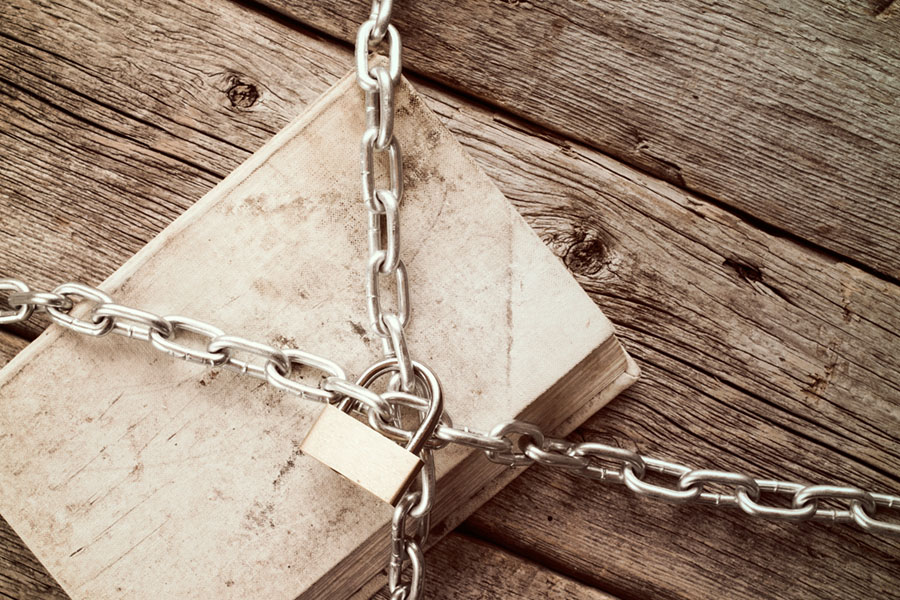
Concern About Censorship in Literature – Where Does Censorship in Literature End and Community Good Begin?
Where Does Censorship in Literature End and Community Good Begin?
In essence, censorship in literature is of at least two kinds. One method occurs before a work is in print. When a publisher decides not to use a particular manuscript for other than economic reasons, the work has been censored.
Efforts are made to prevent certain information from being circulated in another way, however. Elected officials may put laws in effect that prevent publishers from putting certain ideas into circulation.
In both cases, pre-publication censorship involves suppression of ideas with which the publisher and the government do not agree.
In many cases, the decision-maker uses the argument that some ideas or subjects are a threat to the community and must be restricted. While there are certain actions that contribute directly to public disorder, arguing that ideas do the same is much more complicated.
At the heart of this matter is this question: Are publishers and government officials really trying to protect the community? Proponents of informational freedoms argue that censorship in literature is more often an effort to put down dissent.
This may be just another way of saying that the person making the censorship decision doesn’t agree with the idea or subject under discussion.
Censorship Comes Alive
A Second Animal Comes Out of the Cage
A second animal rears its head when censorship in literature is under discussion. Ideas may also be censored after a book, magazine or newspaper is in print.
This restriction may occur at the point of distribution, when a company may refuse to even carry the book from the warehouse to its intended destination.
Retail stores and bookshops may refuse to keep the item on their shelves, effectively preventing citizens from having access to it. Local government officials may decide to withhold a book from the public-library shelves.
Decisions to Restrict Literature by Community Groups
This may happen before the book is put on the shelf for the first time. It may also be a response to pressure from a small group of parents or other community members.
In either case, literary censorship has a foundation in history. Church leaders devoted a great deal of time to restricting information. The Catholic Church had a list of specific published material that was forbidden.
But the decisions of a private organization whose members are volunteers are somewhat different from the censorship practiced by elected officials, who supposedly represent the public.
Laws have been passed in both the United Kingdom and in the United States specifically for the purpose of suppressing certain ideas. Such timeless classics as Ulysses by James Joyce and the works of D.H. Lawrence have been at the center of the censorship storm for decades.
Protecting the Community or Imposing Philosophy?
So have works dealing with homosexuality, drugs and other lifestyle choices. To many, the more disturbing censorship issue is suppression of ideas in a political setting.
This most often involves trying to define who is a radical or a threat to the status quo. This takes a very disturbing turn when blacklisting writers who are suspected of espousing particular theories.
While there may be situations in which the public order must be protected, most proponents of literary freedom argue that these incidents are very limited in number.
To them, continued and growing efforts at censorship in literature are nothing more than authoritarian control. Details on specific political suppression may be found in the stories of Boris Pasternak or Aleksandr Solzhenitsyn.
For those who believe this happens only in authoritarian states, the censorship of written material for political reasons has not been limited to non-democratic countries.
At one time or another, such classics as Canterbury Tales, Civil Disobedience and Call of the Wild have been on lists of censored items. There is a concerted effort to battle censorship, however.
The efforts of the American Civil Liberties Union (ACLU) stem from efforts to end censorship. Those interested in the subject may also want to find out more about the National Coalition Against Censorship.
As one observer stated during a community-led protest against censorship in literature, there may be a need to protect against obscenity or violence in limited situations. But there is seldom a need to restrict the sharing of information in a free society.

 My First Amazing Ayahuasca Experience
My First Amazing Ayahuasca Experience  Pine Needle Tea
Pine Needle Tea  The REAL Controllers of Humanity: The Papal Bloodlines
The REAL Controllers of Humanity: The Papal Bloodlines  Is it Global Warming or Cooling?
Is it Global Warming or Cooling?  Gun Rights and Obama Examined
Gun Rights and Obama Examined